By Sabina Dana Plasse
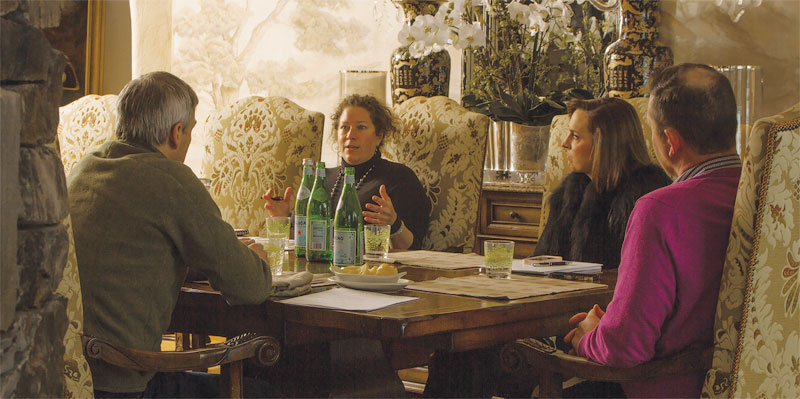
Western Home Journal invited some of Jackson Hole’s leading real estate agents to participate in its first real estate round table at Teton Pines. Brandon Spackman of Spackmans & Associates | Sotheby’s, Mercedes Huff of Mercedes huff & Associates | Sotheby’s, Julie Faupel of Graham Faupel & Associates, and Jeff Ward of Realty Group of Jackson Hole | Sotheby’s gathered to discuss the Jackson Hole real estate market and the road ahead for buyers and sellers in the Jackson area.
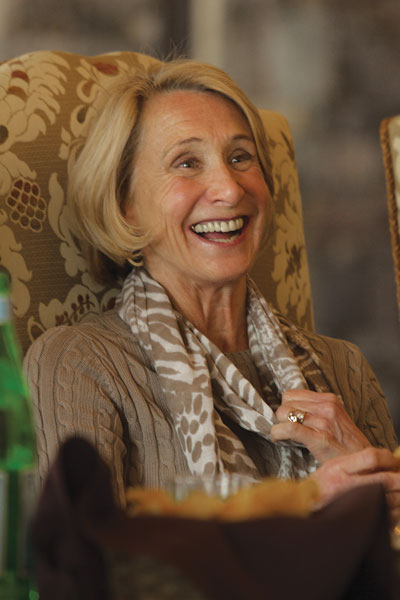
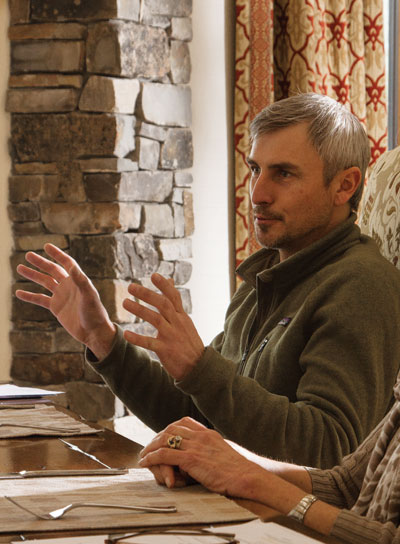
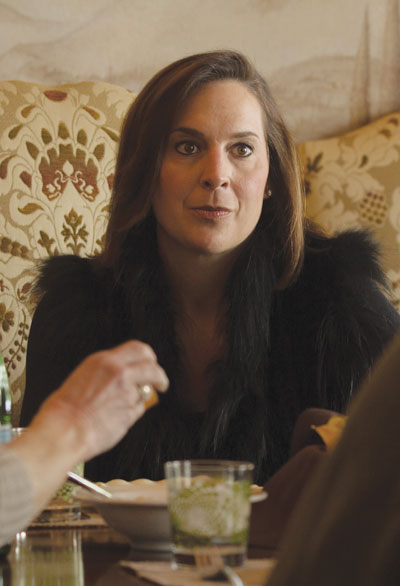
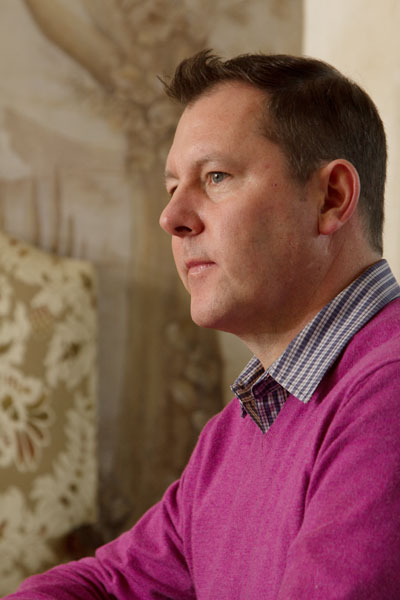
Residents of Jackson Hole pride themselves on the majestic scenery, the wide selection of outdoor activities, and a highly regarded arts and culture community all within a state that is economically stable. With the added bonus of very appealing tax laws for the real estate investor and state resident, agents are very positive about the status of the market. WHJ asks agents to weigh in on a variety of market-related topics including the uptick in the movement of inventory and the impact certain building restrictions have on development. The overall quality of life and the momentum of the market make Jackson Hole an attractive investment and a market to watch.
What are the highs and lows for the Jackson Hole area real estate market?
Mercedes Huff: In terms of price range, there’s a huge span for residential properties with condominiums starting at $245,000 and the large, estate properties, which go as high as $25 million.
Brandon Spackman: Homes start at $500,000 and go up to $25 million. We have historic ranches listed up to $60 million.
Julie Faupel: Inventory is at an all-time low for the Jackson Hole market, which is putting upward pressure on pricing. While there currently remains a limited supply of single-family homes under $600,000, I think that we will see that inventory depleted as soon as this summer. As far as the high-end of the market is concerned, values there can range in excess of $20 million and generally represent some of the most significant and unique properties in the world.
What is the state of the commercial market?
Huff: There’s been a frenzy in commercial real estate over the last six months. Most of our commercial real estate buyers want to invest in Wyoming because the tax-friendly status makes it a great place to put their money, sit back, and receive a nice cash flow.
Spackman: It’s become an investor driven market—few end-users. They’re looking at it for a very passive investment at a 5-6 percent CAP rate. They want long-term leases in place but need to see the ability for future growth.
Faupel: Office space in town averages in the $20- to $25-per-square-foot-range down from closer to $30 prior to the downturn. Retail spaces around the square have stabilized in the mid-$30-per-square-foot range with the largest change being the Town Square properties, which peaked over $70-per-square-foot and are now closer to $50-per-square-foot. We had a large amount of shuffling in the downturn with long-time retailers moving a block or two closer to the Town Square as opportunities presented themselves due to vacancies. The trades in the retail and office sectors have slowed over the last year as available properties have decreased and tenants have stabilized.
Jeff Ward: The commercial market is really interesting. It’s steadily ramping up from where it was during the recession. Town Square rents have stabilized as others have noted. As Julie noted, many businesses were able to shift from off-square to on-square because of new rent values. Rents are now moving up considerably because there is limited supply. From a building purchase standpoint, there were many expensive purchases that went down in value relative to rent rolls, but now we’re seeing an upturn. Sales prices were based on CAP rates of five percent, then a few opportunities emerged at eight-plus percent and now it’s back in the six percent range, plus or minus, depending on the specific building or type of commercial asset.
Is the residential market impacting the commercial market? Are new businesses moving to Jackson Hole?
Spackman: There has been some movement here. There are a few businesses from California, for example, that are relocating to Wyoming for the favorable tax climate. Smaller companies are bringing their employees here, purchasing commercial space, and finding homes for their employees—buying homes.
Faupel: People are definitely bullish about Jackson. We have the perfect storm of amenities: favorable lifestyle benefits, the overall tax climate, and some of the best flight access in the mountain West. With 12 direct flights into our airport, the accessibility is a huge selling factor creating a climate of escalating demand. We’ve seen entire corporations relocate to Jackson where both the principals and the employees can enjoy this type of favorable financial and lifestyle environment.
What trends are you observing?
Ward: Several years ago we had more difficulty in overcoming objections from buyers who were interested in other resort areas because of the lack of direct flights into Jackson Hole. With the help of Jackson Hole Air, as well as the Travel and Tourism Board, we now have more seasonal direct flights into Jackson from New York City, Los Angeles, Chicago, Dallas, Atlanta, San Francisco, Seattle, Houston and Minneapolis. These direct flights have increased accessibility to the area both in summer and winter—this means new opportunities for buyers who maybe didn’t look as closely at real estate in Jackson Hole. Whether you’re looking for a luxury ski or Western-style home, a slope-side condominium, or an investment property that you can personally enjoy from time to time, there’s something for everyone.
Huff: We’re able to accommodate a great deal of the workforce in housing which was purchased during the downturn at ‘free market’ rates as opposed buying ‘attainable’ and subsidized rates. A lot of people wanted to jump on that opportunity so they didn’t have a deed restriction on their property 10 years from now.
Spackman: The market had its fourth year of improvement last year. We’re still seeing strong market activity this year and a subsequent reduction in inventory. Our low inventories will start to put upward pressure on pricing, and in some parts of the market, we are already seeing this.
Faupel: Families and relatively younger buyers are drawn to the Jackson destination as it becomes more accessible. We’re seeing more buyers who want to have a generational asset, and they recognize the value in property in a place like Jackson Hole. Whether it’s someone in search of a family compound for multiple generations or a family with children attending the Teton Valley Ranch Camp, overall, buyers are recognizing how special this destination is. Buyers are also recognizing that they don’t have to sacrifice the cultural aspects of their more urban environments. Jackson’s evolution has continued to increase offerings for a diversity of interests, which is also fueling demand.
In what segments of the market is the inventory tight?
Spackman: Across the board—from resort condos to vacant land to single-family homes—all price points.
Huff: I agree, currently, there is a shortage in all segments, but it’s a hard thing to gauge what it will be like this summer because we have sellers who typically wait until June to step forward.
Faupel: We’re working with buyers who are dedicated to finding a home in Jackson but are not finding inventory that they like. I think tastes have changed—more toward mountain-modern, green building, smaller square footage, and higher quality—overall efficiency. There’s a perfect buyer for every property, but what the masses are looking for has evolved in the last five to seven years.
Huff: It’s the demographic. Over the last 20 years, we’ve had a lot of people who bought the bigger log homes but these people are often in their 60s and 70s. Today, we have 40-year-olds coming in and their tastes are quite different. A more urban, contemporary styling tends to be popular.
Spackman: You’re seeing that in the newer construction.
What makes the Jackson Hole market unique?
Faupel: I think that one of the most unique aspects of Jackson is that we are a community first and then a destination. The residents of Jackson take a vested interest in ensuring that as the destination develops, the character and integrity of the community remains intact. Many of the community leaders and philanthropists possess a unique, entrepreneurial spirit that has helped guide their successful careers, and they bring those core values to the evolution of Jackson.
Ward: The state, town, and county all benefit from the significant natural resources in Wyoming. The state’s population of just over 575,000 people coupled with natural resource revenues and tourism tax dollars allow for an economically sound state. Wyoming’s budget surplus is like no other in the U.S., which directly benefits its citizens.
What type of properties are most buyers looking to own?
Spackman: On the high end, as we said, we’re seeing demand for a ‘mountain modern’ type with rustic materials but with clean architectural lines and only a few materials. Buyers no longer want the large log home with antler chandeliers.
Huff: Isn’t that funny that reclaimed materials are the high-end? Water views and privacy— it’s pretty easy. To have the drama of the Tetons and the Snake River. The “Wow.” It’s not just a mountain town, it’s so dramatic, and it’s almost addictive. When they go back to New York, they’re never the same.
Faupel: We continue to see varying demands based on individual lifestyle preferences. Overall, we’ve seen an increase in people looking for a house that has a main floor master and a sensible floor plan that can be comfortable for a couple or expanded for when they have visiting family or friends. I also think that access to particular amenities drives demand as well. Whether it’s skiing or golf, proximity to the national forest land or fly-fishing—buyers are looking for access. Buyers want to be close to the lifestyle amenities that have brought them to Jackson.
Ward: The good news is that there are options for every type of buyer. We have buyers looking sub $300,000 to over $20 million. It’s a unique market for that reason and our team enjoys forging relationships with this vast range of buyers. Meeting new people and developing long-term relationships is what it’s all about.
Are you seeing more people retiring to Jackson?
Faupel: Even for resell, we are seeing more plans for retirement and an elevator is a factor in many plans. The inverted floor plan is great to capture views and upstairs living. We’re building a spec house in Teton Pines with an elevator, which makes sense for groceries and luggage.
Spackman: Or for surgeries.
Huff: We are all getting older!
What is the biggest draw for buyers in the Jackson Hole market?
Spackman: Buyers feel good from a natural resource standpoint because we’re very rich in them. We have a very favorable tax climate, great estate planning, wealth preservation laws and our state, as a whole, is financially very sound. Jackson can also be viewed as an inland island with very little land remaining for development. Over 97 percent of the land has been protected. This makes buyers feel safe from a long-term investment standpoint. Plus, you can’t beat the quality of life and community.
Ward: I don’t know the exact number, but there’s enough coal in reserves in the state of Wyoming to heat the entire country for 100 years.
Huff: I just read an article about how coal, even though people associate it as dirty, is being cleaned up, and it’s our number one source of fuel again.
Ward: It’s been a process of perfecting and trying to reduce coal’s pollution. It’s a very favorable source of energy.
Huff: Buyers and potential Jackson residents are also drawn by national forest access.
Ward: The natural resources are huge for us. Our close proximity to the national parks is our biggest asset. Everyone knows Yellowstone and that draws people here from all over, even internationally.
Faupel: There’s a cultural aspect here that’s different than any other ski town because of the stewardship mentality of the residents. Teton County, Wyoming, is the most philanthropic county per capita in the country. You have this wonderful physical environment complemented by the most dynamic and interesting people. In the last couple of years, we’ve seen local organizations focused on fostering entrepreneurship and driving business to different parts of the economy besides tourism. People come here and know it’s not just a ski town—it’s a much more evolved destination.
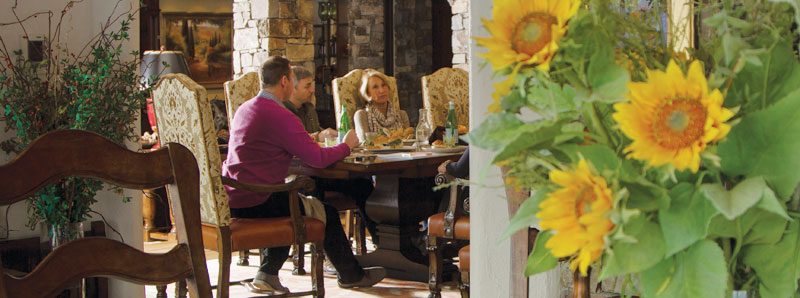
Has technology played a role to moving and living in a ski town?
Huff: Absolutely! Nobody knows you’re gone and you can work remotely. We see our technology services being upgraded constantly. There’s a fight for more cell towers.
Spackman: Technology has definitely opened the door for people to work in more remote areas such as Jackson. Any yes, Jackson has been improving its technology infrastructure with fiber optics and increased cell towers, however they have to look like a tree.
Faupel: I think that technology has made it possible for more buyers to enjoy the lifestyle benefits while still maintaining a successful career in various parts of the country. We have a number of clients who are raising their families in Jackson while one or both of the parents telecommute.
Does lifestyle play a role in first time buyers or second homeowners looking for a mountain community?
Huff: There are a lot of healthy, outdoor type people who love the lifestyle but often the biggest attraction for buying is tax driven.
Spackman: Definitely. We have the best ski area in North America, and we border Grand Teton and Yellowstone National Parks. Not to mention, the Snake River flows through the middle of our valley. The arts are a very important draw as well with National Wildlife Museum, Center for the Arts, and Grand Teton Music Festival.
Huff: The Center for the Arts is really important. Even though Wyoming is tax friendly across the state, everyone wants to live in Jackson because the rest of the state is not as beautiful. We get the best of the best.
Ward: I have a kindergartner and a second grader. We have amazing teachers, wonderful schools, and just a tremendous community overall. Due to the state’s generous budget, education in Wyoming is well funded. My kids have the best resources to learn, which is very important to me. These resources are available from kindergarten through high school and all the way through college at the University of Wyoming, the state’s only four-year college.
Huff: It’s also a safe place. People come here who are tired of turning on the security system and locking doors. They don’t worry about kids getting home safely from school. Kids ride their bikes to school. We have phenomenal path systems, which are a huge draw.
Spackman: The new pedestrian bridge over the Snake River is going to be a big perk. This will connect over 60-miles of paved pathways throughout the entire valley and into Grand Teton National Park.
Ward: We have an incredible hospital too. The CEO recently forged a new relationship with the University of Utah providing real-time connectivity through high tech fiber optics. This is a wonderful addition to the already well-equipped hospital.
Faupel: I think that lifestyle is important, but it’s not all encompassing. We have a very strong school system and our hospital just completed a multi-million dollar, state-of-the-art expansion. Additionally, we have a spectacular thriving arts community as well as a spirit of philanthropy where our Community Foundation has been modeled by other destinations all over the country. Many buyers may be drawn to Jackson by one lifestyle aspect, but once they truly get to know the diversity of the destination they love it even more.
What is your best advice for a buyer looking at the Jackson Hole market today?
Huff: Buy in Jackson. You can relax and get away from it all. You’re still connected, but you can chill out.
Spackman: You have to be understated. Big egos don’t work here. People love to come here knowing that no one cares who they are from a material standpoint. What matters is a life-passion standpoint.
Faupel: There’s no time like the present. While we are seeing increasing property values, there are still some great opportunities that exist at varying price points. But it’s so much more than finding a great “deal.” We don’t hear feedback from people who regret buying a place in Jackson. In fact, we have a client who bought a place a couple of years ago and he signs his emails ‘future Wyoming guy,’ reflecting his intention to retire to Jackson. It’s a place that makes you feel good, and once you’re a part of it—there’s no place in the world you would rather be.
Ward: There are buyers within every demographic with the same common vision to be a part of the local community even if they don’t live here year-round. It’s a good feeling when you have a client you sold a house to, and they’re in their office in New York City calling, texting or emailing you about what’s happening in Jackson.
What distinguishes Jackson Hole from other mountain town communities?
Huff: We’re unique because we’re not a big blend of wall-to-wall subdivisions. We’ve had the opportunity to be distinct because only three percent of the land is privately owned. And The flights to Jackson were a business initiative.
Spackman: We’re a younger market. We had people in the community who had the foresight to put in some land development regulations and develop the land trust so we have grown in a thoughtful way.
Huff: We’ve had the structure from which to work—namely Rockefeller who put aside the Grand Teton National Park, and we have Yellowstone. Those are national treasures that are already set in place, and everyone wants to preserve the community around them as well.
Spackman: It’s a legacy of conservation and natural resource protection including the wildlife.
Huff: It’s still a small town. It’s being able to drive around town and wave at people you know.
Ward: People are sometimes surprised when they learn that Jackson Hole is more popular in the summer than in the winter, even with Jackson Hole Mountain Resort’s recent #1 ranking in SKI Magazine.
Faupel: Again, I think it relates back to the fact that we are a community first. There’s no gentrification of classes. Everyone hangs out with everyone. Ski bums and power brokers all share the same passion, and Jackson connects all of us. Your friends become your family, and the community embraces you. For example, if you consider the support for the non-profits, there are over 250 non-profits in the area, and last year we surpassed $100 million raised by the Community Foundation over a period of 17 years. You have people who give a few dollars and those who give hundreds of thousands of dollars but regardless of capacity, we all come together to support this place that everyone loves.
What types of land restrictions exist in the Jackson Hole community?
Huff: There’s a push to protect the Town Square. There are a few places that will get stepped up to three stories. The rules are very strict about not allowing people to change the landscape to look like Anytown, USA. Commissioners want to keep it in its natural state as much as possible. The key is to keep the valley looking as wild, and put pockets of infrastructure in.
Spackman: You can only build up to 8,000-square feet of habitable living space. There are some loopholes such as underground square footage and basements, but you will never see a McMansion.
Faupel: Yes, Jackson has made a conscious effort to maintain its community character by limiting the size of homes and the ability to subdivide parcels. Guest homes are also limited to 1,000 square feet of home. These regulations are reduced some by smaller parcels, and the total construction is increased some in larger parcels serving the needs of ranch properties. The town and county are in the final stages of revising the 1994 Comprehensive Plan to create more predictability as to where development can occur and to define the future build-out of the valley. The intention here is to have rural lands look and feel rural for the long-term and to strategically place growth in areas that make sense considering traffic impacts, available commercial services, and the capacity of the road system. Height restrictions also occur but are most noticeable in the commercial districts of town as there is a desire again to keep the character of Jackson Hole as it is.
Huff: Wildlife is a priority and drives a lot of what is protected. We have natural resource overlays. There’s only three percent of the land to develop, and a lot of that has been placed under protection. We’re down to two percent and that becomes overlaid with migrations routes. You can’t overbuild. Elk herds must still be able to wander through your property. People love it.
Ward: You can put your land in a conversation easement, which is a tax benefit.
How is the market for new construction? Remodels? Resale?
Faupel: There is very little new construction on the market and, as a result, we are seeing more properties purchased with the intent to remodel. For example, if you look at East Jackson, we’ve seen appreciation at about 50 percent over the last nine months. It’s soared. Demand is driven by people who are now downsizing and want to be closer to the downtown amenities but don’t want to sacrifice in terms of quality and finish level. If there is new inventory, there is general competition among buyers.
Huff: They’re scrapping. They’re buying the little old modest brick ranch and doing a demo. There’s no more space for new development. What I find fascinating is that when I show a house and a buyer says, “This is 20 years old.” 20 years old! I grew up in a house that was 250 years old. It was kind of cool but now they say 20 years old as if it’s about to fall down.
Spackman: It’s the first time we’re really seeing new homes going up since the recession. The new building trend is due to a lack inventory and market confidence.
Ward: I live in town so I see what types of property are potentially poised for redevelopment. There are many older homes that could be the next generation of remodel or new construction. I think the residential areas within the town of Jackson will likely see the most change in years to come. Teton Village also has about 25-30 percent more land to be developed, so there is still plenty of opportunity even with the scarcity of land.
Huff: I hope they keep some of the charming ones.
How is the inventory for condos?
Huff: I recently looked up pending, active, and sold for the last twelve months. 295 town homes and condos pulled up. 86 were active, 25 are pending and the rest were closed. So, about 180 closed in the last year. Five years ago, you couldn’t give them way.
Faupel: That’s less than six months of inventory. If it’s well priced and a good product, it will sell, and you will have competing offers the day it goes on the market.
Spackman: Very low. There are still some good buy opportunities at the Jackson Hole Mountain Resort, but that won’t last long. Prices are starting to trend upwards.
Is there anything you would like to see improve in the Jackson Hole market?
Huff: I think what is happening with the Snow King area and having it become its own destination is exciting.
Spackman: There are discussions on making it more an event mountain with zip lines, and terrain parks with races.
Faupel: It would be wonderful to have some more inventory as we have certainly seen increased demand as buyers are feeling more confident in the overall economy. That said, scarcity is creating a climate for our sellers that we haven’t seen in years.
Ward: What’s important and relative to real estate is the growing attraction of the Jackson Hole Mountain Resort. There’s still somewhat of a misconception that skiing Jackson Hole is only for advanced skiers, which is not true. The resources invested by the ski area over the years have dramatically changed the visitor experience. Modifying some terrain, improving lift service, adding mountain biking access, and all of the other services, events, amenities, and new hotels have contributed to what is now one of the best experiences on the map.
Spackman: We had a bad boy reputation for being too cold or too steep. We need to continue to add to our affordable housing stock in order to protect the future of home ownership among the working-class community here. We also need to balance growth while protecting the inherent rights and entitlements of landowners.